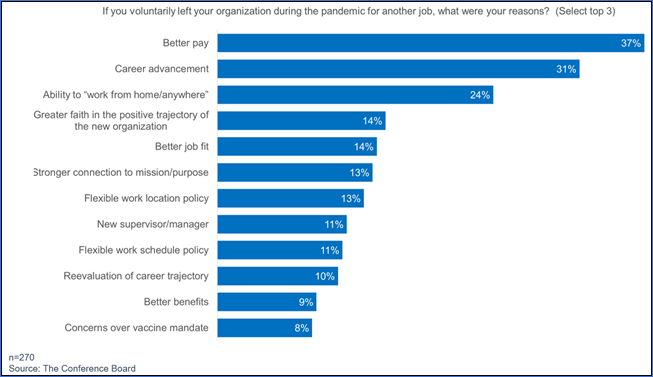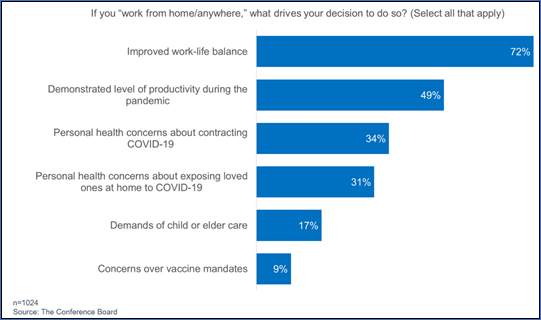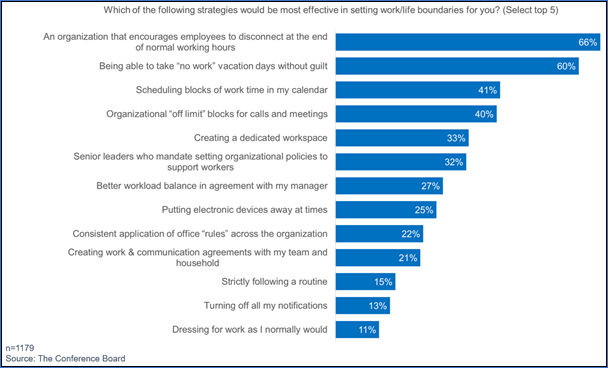News December 03, 2021
Survey: Quest for Remote Work Drives 'Great Resignation'
Nearly a quarter of workers who have quit their jobs during the pandemic have done so for the flexibility to work from anywhere, a study from The Conference Board found.
Promotional products firms and other companies across industries that are struggling to find workers may want to consider allowing employees the flexibility to work from home when job responsibilities allow for such an arrangement, as doing so could help attract quality candidates.
That’s a key takeaway from a just-released survey that found that nearly a quarter of workers (24%) who changed jobs during the COVID-19 pandemic did so for the ability to work from home/work from anywhere. Men were more apt to leave one job that did not offer remote work for another that did, as they left former positions for a flexible work location at more than twice the rate of women.

Better pay, career advancement and the ability to work from home/anywhere are the top reasons people have left one job for another during the pandemic, a survey from The Conference Board found.
The findings from The Conference Board, a nonprofit, nonpartisan think tank, further found that Baby Boomers quit for the option to work from home/anywhere at twice the rate of Gen Xers and Millennials.
“Story after story has covered the premium that younger generations place on flexibility in the workplace,” said Rebecca Ray, executive vice president of human capital at The Conference Board. “But as these survey results demonstrate, that desire is not unique to Millennials.”
The study, which surveyed 1,200 workers in the United States, found that workers believe flexibility is pivotal to supporting their mental health. Indeed, seven in 10 workers asserted that flexible official work hours and/or a compressed work week is the top policy businesses can enact to support their mental health.

The survey revealed that employees believe flexibility in work hours and work location are vital to their mental health.
While the ability to work remotely was a top-three factor in workers voluntarily leaving their positions during the pandemic, it still came behind better pay, the top reason cited by 37% of respondents, and career advancement, cited by 31%.
Notably, 50% of women reported working in a fully remote position, compared to 37% of men who reported the same. When it came to hybrid models – a mix of remote and in-office – the breakdown was 39% of women and 47% of men. Meanwhile, 10% of women and 14% of men reported being fully on-site.
Looking to hire? These tips can help. https://t.co/MipLJMw52N@TheresaHegel
— Chris Ruvo (@ChrisR_ASI) December 3, 2021
“Businesses must ensure that remote workers – many of whom are women – receive the same developmental and promotional opportunities as those who are on-site,” said Amy Lui Abel, vice president of human capital research at The Conference Board. “Companies should be mindful of this potential pitfall, creating a level playing field for all workers as they develop their talent strategies in a world where less work is conducted in the office.”
Interestingly, the survey found that concerns over contracting COVID-19 or bringing it home to loved ones were not major reasons employees want to work remotely. Only about a third of respondents cited such factors in their decisions to work from home, the study showed.

Asked what drives the decision to work remotely, only about a third of workers cited COVID concerns.
According to the findings, 15% of workers see no value at all in returning to the physical workplace. Those who do see value in such a move most often cited connecting with team members (74%) and socializing/gathering with colleagues (55%) as the best reasons to return.
Additionally, the survey found that workers want organizations that set boundaries and leaders who respect them, with 66% of respondents opining that their organizations should encourage employees to disconnect at the end of normal working hours, and six in 10 asserting they want to be able to take “no work” vacation days without guilt.

Establishing work/life boundaries is important to workers, the study showed.
“The survey also reveals that almost half of workers believe that their managers adequately address mental health concerns – but one in five do not,” said Dr. Srini Pillay, co-founder and chief medical officer at Reulay, Inc. and former head of the outpatient anxiety disorders program at Harvard Medical School’s McLean Hospital. “An overwhelming majority agree, however, that organizations should offer training to managers so that they can better address the sensitive mental health issues of workers.”
